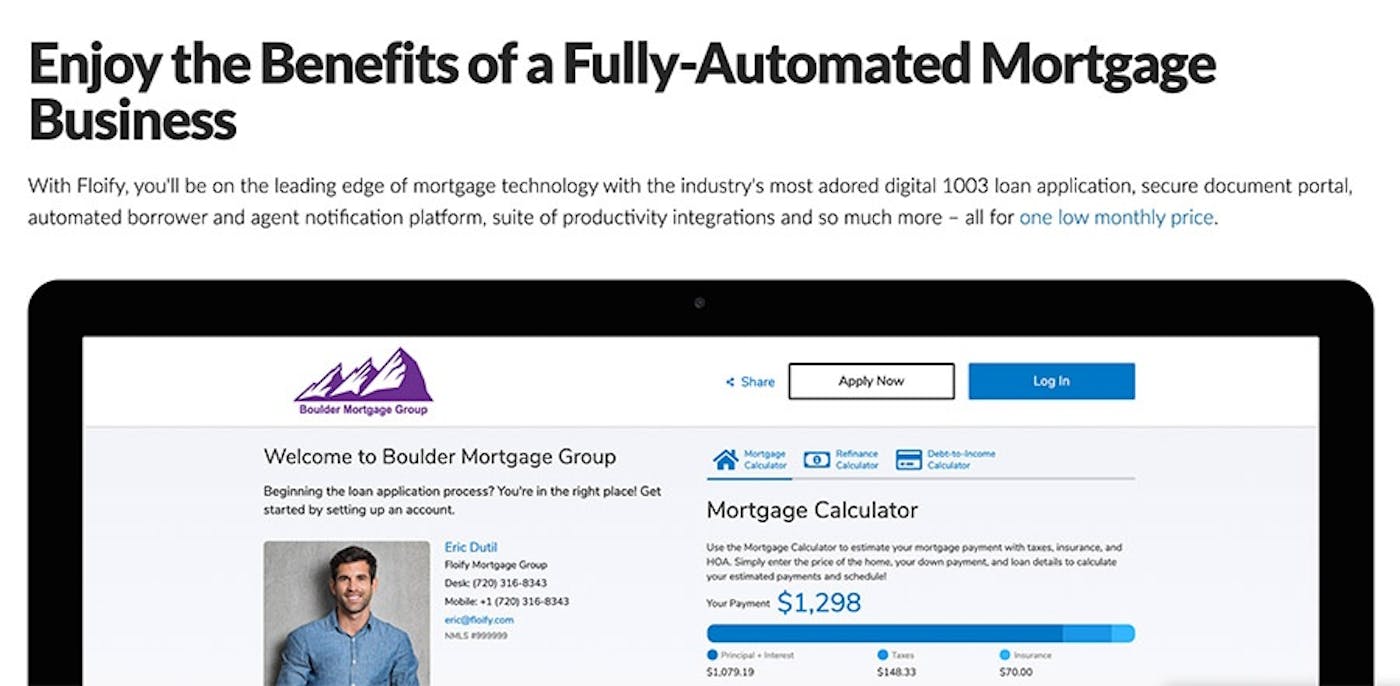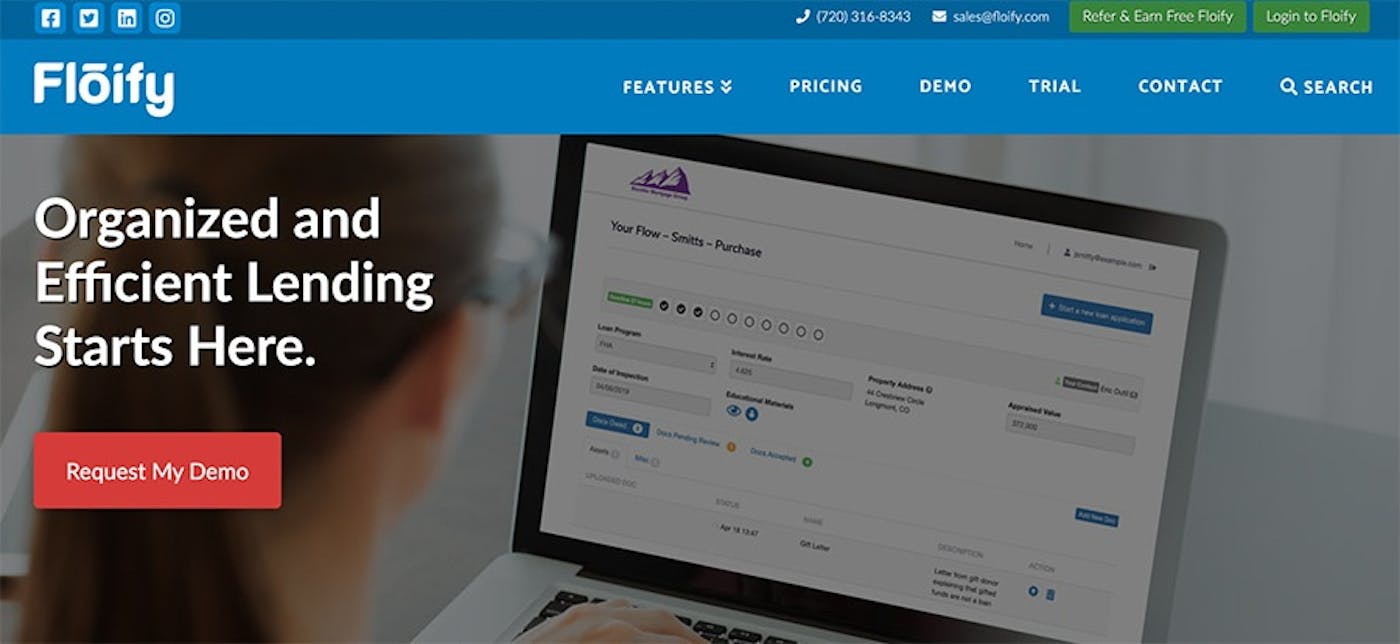I Ran My Side Hustle During Work Hours. Now It Makes
Millions.
What is your background and what are you working on right now?
Professionally, I've always been a software developer — for over 19 years. I started a software company called Flux, which is still going strong. Flux is a file workflow orchestration platform for banks, FinTech, media, and entertainment companies. I've focused on that since the summer of 2000.
Floify spun out of Flux about six-and-a-half years ago. Both Flux and Floify are self-funded, and as we've grown, we've naturally transitioned into being customer-funded.
 ## How much money is Floify making today?
## How much money is Floify making today?
Right now, we're up to about six million in annual recurring revenue.
What motivated you to get started with Floify?
To give you a little more background, I refinanced my home about seven years ago. It was essentially a really terrible borrower experience. I knew it could be better for both borrowers and the people on the lending side of the fence.
So what motivated me was both the bad borrower experience and thinking I could make things better for the people who worked at the banks, credit unions, or mortgage companies. And also the sheer excitement of having the opportunity to help so many people.
We now have over a million registered users on our platform, and that blows me away, given that there are only about 330 million people in the United States. The fact that we've helped over a million of them, to me, that's pretty awesome.
Did you do anything to validate your idea once you had it?
If I were to do it again today, I would do more validation than I did then. I did a little validation: I poked around to see if other people were doing it, found a couple of companies that seemed small, and felt like it was a good play. Fortunately, it worked out.
What went into building the initial product?
In the beginning, Floify spun out of Flux. We used some of our developers (including myself) from Flux to build the product. We had a real MVP up and running in about three months. At that point, I didn't hold back and decided it was time to get it out there. We launched in August of 2013, and it's been a quick, agile feedback loop ever since.
How'd you find the time to work on Flux?
I worked on Floify while in my role at Flux. Since I was the CEO and owner, I made Floify my primary project in the beginning. It was a part of my day-to-day.
How have you attracted users and grown your companies?
In the beginning, it was so difficult. The first couple of years were pretty tough, asking for referrals, creating content on our website, spreading the word through friends. Nothing too out of the ordinary.
The very first thing we did was put out a press release, and we actually got our first customer that way. Her name is Melanie, and she's been with us for six-and-a-half years. Although I wouldn't go as far as saying you should never do a press release, I wouldn't recommend them — they don't typically generate many leads.
How would you describe your business model, and how have you grown your revenue?
We are a B2B SaaS company, but we're a little bit different than others.
We used the old bottom-up model, as we sold initially to individual loan officers. Then after a couple of years, we were finally able to "grow up" and speak to the decision-makers at mortgage companies and banks.
So the single loan officers who became our customers then introduced us to the decision-makers — the good old land-and-expand.
Do you have any advice for aspiring entrepreneurs based on what you've learned with this?
I would say your idea can absolutely work, and I think Floify is just one of many data points that shows that it works.
If we came straight out of the gate trying to land an enterprise deal, it would've been really tough. In the beginning, I was an introverted software developer, and even though I made sales and helped with marketing and support, I'm not a good enterprise salesperson at all. Or a good salesperson in general. But starting slow and building trust over the course of a couple of years can certainly work. And continue to ask, "Who can you introduce me to?"
Going into sales and marketing as a developer is a challenge for a lot of folks — do you have any advice on that point or anything that you found worked for you during that phase?
I will borrow a quote from Jocko Willink and say that I was given a choice to overcome my inherent shyness and flip the switch. It was either do that or don't. So I did it.
It's not my inherent personality, but if I had to talk to someone passionately about my product, I might not usually show my excitement. But I did, and it just became more natural over time because I'm genuinely excited about everything we did and are doing, so I just let that excitement shine through.
What are some of your goals for the future?
We're aiming to reach some impressive numbers, and the amount of people we're helping really does blow me away. For example, we're doing over 55,000 loans on our platform each month. Back in the beginning, I was so excited if we had just 10 loans started in a single month. The most exciting number is our loan volume per month, which has now reached over $15 billion.
I hear from loan officers and our enterprise customers that our software has not only made their daily lives better but their businesses as well.
What are some of the biggest challenges that you faced and the obstacles that you've overcome?
Six years ago, I had a neighbor who owned a bank, and I told him what I was doing. Since he thought it was a great idea, I decided to let him use it for free to get some feedback.
But the problem with having a free customer is they don't always use the product or appreciate it. Since they weren't paying for it, they weren't motivated to use it; and that was the first and last time I've ever given away our service for free.
I would say that's probably one of the worst things you can do, because when someone's not paying for something, they don't value it as much. Or maybe they ask for features that a paying customer might not want. In this particular case of my friend who owned the bank, one of his employees was requesting features that didn't correspond to the feature requests from actual paying customers. I'm really happy I learned that lesson very early on.
Is there anything else you would have done differently?
Hiring smart, talented, motivated people makes all the difference. One thing I'll say is that when someone joins our company, we put a lot of emphasis on ownership and trust. We tell each new employee that they have a sort of sphere of their own autonomy and trust, and that sphere can grow or shrink.
We want to give people more and more autonomy as they're going about their job and expanding the scope of what they do. And then they grow their trust.
This is a great way to attract high-performers because you can't get anywhere without high-performers. And what's one of the obvious ways to attract high performers? Creating a great working environment that makes them love coming to work; they know they get to exercise their creativity, and they have the freedom to advance.
Is there anything that you have found particularly helpful or advantageous?
The person who has had the most significant influence on me is Jason Lemkin. I've read every word he's written. I've watched every one of his videos. He's in the B2B SaaS space, and a lot of what he says is spot-on accurate.
What is your advice for any Indie Hackers who are just starting?
Understand yourself well enough to know if your side project is something you can actually pull off. In my case, I found that I could only work when the sun is shining, Monday through Friday. So I tweaked my professional and personal life to that reality.
I've always had to push myself a little bit to become a good salesperson, but there's no way you're going to be able to work on all of your weaknesses. We are who we are, so be realistic about what you're good at and know the areas that you could improve on. Know what you are good and bad at, and just run with your strengths. And don't give away your stuff for free.
Where can we go to learn more?
For me personally, you can follow me on Twitter, Instagram, and LinkedIn.

Great interview @floifydave and @csallen! I really like that you (Dave) spoke about being excited by those first few customers and that it was a big deal.
Celebrating those early wins in the early days is so important to keep spirits high and keep going.
I also like that Melanie is still with you today! Love that! 🙌
Yes, Melanie's awesome, hope to see her next week.
Cheers for the kind words, Anita!
"Customer-funded", love it!
Serving over one million registered users... How big is your team now? I couldn't find anything on floify.com
You said you initially sold to individual loan officers and later to decision-makers at mortgage companies and banks. Was there a tipping point in terms of growth or you just kept growing gradually over time?
We stand at 35 employees today.
I'd say that growth was steady and gradual, although it certainly picked up as we began signing up true enterprise customers.
There were certain customer-driven popular features that drove growth points, which in turn pushed us to new growth metrics.
My job felt different at different employee thresholds, especially at 10 and 20 employees.
It took 2 years to reach $100K ARR. Now we more than double that amount of growth every month.
This is so awesome - congrats!!!
Thanks so much!
Great store, thanks so much for sharing :D
Do you mind I convert this piece of article into audio, and share it here?